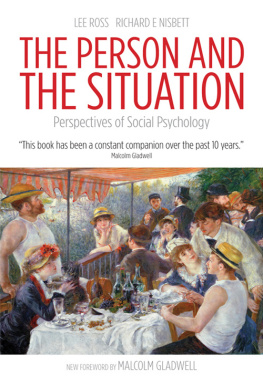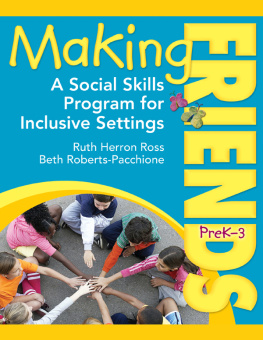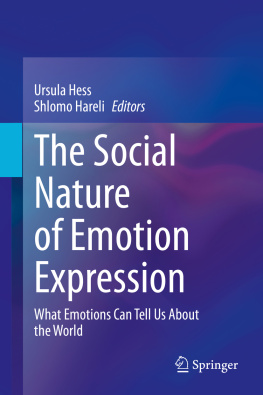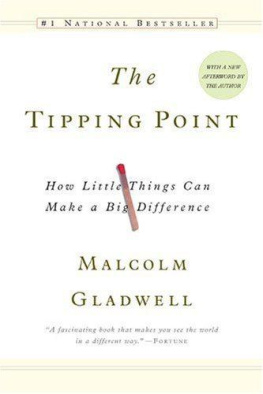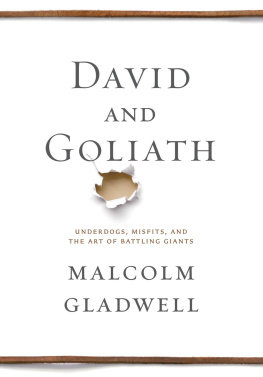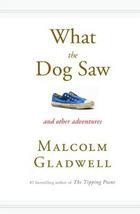THE PERSON AND
THE SITUATION
For Stanley Schachter
About the Authors
Lee Ross is Professor of Psychology at Stanford University. He received his Ph.D. in psychology from Columbia University in 1969. He is coauthor with Richard Nisbett of Human Inference and coeditor with John Flavell of Cognitive Social Development: Frontiers and Possible Futures. He is a founder and one of the principal investigators of the Stanford Center on Conflict and Negotiation. His 1977 article The Intuitive Psychologist and His Shortcomings is the most widely cited article of the 1980s in social psychology.
Richard E. Nisbett is Theodore M. Newcomb Professor of Psychology and Director of the Research Center for Group Dynamics at the University of Michigan. He received his Ph.D. degree in Psychology from Columbia University in 1966. He taught at Yale University from 1966 to 1971. He is co-author, with Lee Ross, of Human Inference, with E. E. Jones, D. E. Kanouse, H. H. Kelley, S. Valins and B. Weiner of Attribution: Perceiving the Causes of Behavior, and with J. Holland, K. Holyoak, and P. Thagard of Induction. In 1982 he was the recipient of the Donald Campbell Award for Distinguished Research in Social Psychology.
THE PERSON AND
THE SITUATION
Perspectives of Social Psychology
Lee Ross
Stanford University
Richard E. Nisbett
University of Michigan
Foreword Malcolm Gladwell
The Person and the Situation: Perspectives of Social Psychology
First published by McGraw-Hill 1991
This edition first published in Great Britain by Pinter & Martin Ltd 2011
Copyright Lee Ross and Richard E. Nisbett 1991, 2011
Foreword Malcolm Gladwell 2011
All rights reserved
ISBN 978-1-905177-44-8
The right of Lee Ross and Richard E. Nisbett to be identified as the authors of this work has been asserted by them in accordance with the Copyright, Designs and Patent Act of 1988
British Library Cataloguing-in-Publication Data
A catalogue record for this book is available from the British Library
This book is sold subject to the condition that it shall not, by way of trade and otherwise, be lent, resold, hired out, or otherwise circulated without the publishers prior consent in any form or binding or cover other than that in which it is published and without a similar condition being imposed on the subsequent purchaser
Printed in Great Britain by TJ International Ltd, Padstow, Cornwall
Pinter & Martin Ltd
6 Effra Parade
London SW2 1PS
www.pinterandmartin.com
CONTENTS
Foreword
I still remember when I first read The Person and the Situation. It was in 1996. I had never taken any psychology courses in college, so the names Nisbett and Ross not to mention Kurt Lewin and Solomon Asch meant nothing to me. I didnt know what the Fundamental Attribution Error was. I had, from my days as a science writer at the Washington Post, a passing acquaintance with the Journal of Personality and Social Psychology and that was it. But by some happy series of coincidences I fell in love with psychology that summer, and started spending long afternoons at the New York University library, browsing through academic journals. I would find an article I really liked, and then read as many of the most interesting bits of the bibliography of that article as I could, and then the most interesting bits of the bibliography of those articles and on and on, walking back the cat, as they say in the intelligence world. (You can kill a lot of afternoons at NYU library that way.) Anyway, the cat I kept finding at the end of those walks was The Person and the Situation. So one day, I sat down in one of the carrels at Bobst Library and devoured it in one sitting. And because I didnt have borrowing privileges, I photocopied it, front to back, in violation I am now ashamed to admit of every rule of copyright. I still have that bundle of pirated pages on my bookshelf. I hope Professors Ross and Nisbett will consider this foreword as partial reparation.
What is so special about The Person and the Situation? You will, in short order, discover the answer to that yourself, and it is not my intention to ruin the fun. But let me offer a few short personal reflections. This is an ambitious book. It might be, in fact, one of the most ambitious books that I (or I imagine you) will ever read. That is the first of its many virtues. It offers a way of re-ordering ordinary experience. It argues that when we perceive the actions and intentions of others, we tend to make mistakes. We see things that arent there and we make predictions that we ought not to make: we privilege the person and we discount the influence of the situation. It speaks, in short, to the very broadest questions of human perception.
I found this idea so disturbing and subversive that I think I have been wrestling with it ever since. Just the other day, for example, I gave a short talk at a gathering of sports-types on one of my favorite topics professional quarterbacks. I argued that the idea that quarterbacks can be ranked that there is such a thing as a good quarterback and a not so good quarterback and that we can say, with certainty, that, say Peyton Manning is x number of points better than Brett Farve is nonsense. A quarterbacks performance is inextricably tied up in his situation: in the quality of the players around him, his coaches, the skills of his receivers, the plays call for him and on and on and in trying to extract some notion of quarterback quality from that jumble of factors we are making an error. (Actually, a Fundamental Attribution Error.) I was making the kind of argument that people make once theyve read The Person and the Situation. Halfway through my talk I sensed that I wasnt getting anywhere, that my audience didnt much agree, and I suspect thats because most of them had not had the benefit of reading the The Person and the Situation. (The next time I will suggest that the organizers of the event invite Nisbett and Ross instead). Thats a trivial example, I know. But thats my point. The genius of this book is that it will insinuate itself into the way you think about virtually everything even Peyton Manning and Brett Farve. (If you care deeply about your professional sports team, by the way, I suggest that you buy an extra copy of this book and send it to the General Manager. Im serious).
What kind of book is The Person and the Situation? It looks, I know, like an academic text. It has almost forty pages of references and indexes. (Walking back the cat, in this case, would take a very long time). It has figures and charts and references embedded in the text, the way that a serious book does. Im guessing that a good number of those of you reading this are college students, to whom this book has been assigned. It would be a mistake, though, to put The Person and the Situation firmly in the academic category. We make that mistake too much, in my opinion, segregating ideas and books by virtue of provenance. The thing that struck me that day in the library and will, I hope, strike you as well is that The Person and the Situation has much more in common with an adventure story than a textbook. There is, on virtually every page, an insight or a little gem of research or an observation that will take you by surprise, and I defy you to predict, with any accuracy, where any chapter is ultimately headed. That is a tribute to the gifts and cleverness of Professors Nisbett and Ross. But it is also a tribute to the tradition that this book belongs to. Social psychology stands at the intersection between our eyes and the world in front of us, and helps us understand the difference between what we think we see and what is actually out there. If you have ever felt the excitement of putting on a pair of glasses for the first time, and seeing the world suddenly jump into focus, then you have some sense of what is in store for you in the pages ahead. You are in for a treat.

